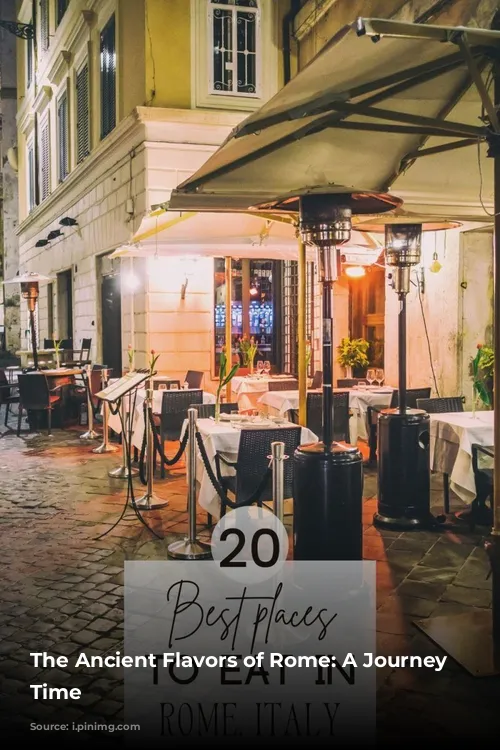Rome, a city steeped in history and architectural marvels, also boasts a rich culinary heritage. Beyond its iconic Colosseum and Roman Forum, Rome holds a treasure trove of culinary traditions that have evolved over centuries.
Let’s delve into the intriguing world of Roman cuisine, where ancient flavors meet modern delights.
The Culinary Legacy of Ancient Rome
The Romans were masters of innovation, not only in engineering and architecture but also in the kitchen. Their love for flavor and experimentation paved the way for a culinary legacy that continues to inspire chefs today.
The first-ever cookbook, De Re Coquinaria, penned by the renowned chef Marco Gavio Apicio, dates back to the 1st century AD. This book showcases the Romans’ culinary prowess, using fresh herbs, vegetables, lamb, and goat meat to create unique and delectable dishes.
One such dish, the abbacchio, a traditional lamb dish, finds its roots in this ancient culinary heritage.
The Birth of Roman Ravioli: A Tale of Spinach and Genius
Roman ravioli, a simple yet exquisite dish, perfectly embodies the spirit of Roman innovation. This delectable creation boasts a classic combination of spinach, Parmesan cheese, and pepper. While ravioli itself may not be inherently Roman, the clever addition of spinach to the recipe is a testament to the city’s culinary genius.
Legend has it that a local family, inspired by the abundance of fresh spinach, decided to incorporate it into their ravioli recipe in the late 18th century. The family was so enamored with the outcome that they documented their culinary triumph, forever enshrining spinach as a quintessential ingredient in Roman ravioli.
From “Pinna” to “Stuzzicadenti”: The Roman Toothpick
Even something as commonplace as a toothpick reveals the Romans’ ingenuity and penchant for detail. In ancient Rome, the humble toothpick was not merely a practical tool but a reflection of social status.
The wealthy elite favored silver toothpicks, while the common folk relied on wooden versions, known as “pinna” (fin).
Interestingly, the term “stuzzicadenti” (toothpick) was a Roman invention, solidifying the significance of this seemingly simple tool in Roman society.
The Importance of Salt and Spices in Roman Cuisine
Salt and spices were integral to Roman cuisine, not only for flavor but also for preservation. Salt played a multifaceted role, serving as a form of payment, a medical remedy, and an essential component of religious rituals.
The Romans were renowned for their extensive spice collection, using over 100 different spices in their cooking, perfumes, and beauty products. They embraced pepper, parsley, saffron, turmeric, and ginger to elevate the flavors of their dishes.
Cazzimperio: The Essence of Roman Flavor
Cazzimperio, a unique blend of spices and herbs, encapsulates the heart of Roman cuisine. This aromatic concoction typically features pepper, basil, parsley, and rosemary, with variations often including sage, oregano, fennel seeds, or celery**.
The term “cazzimperio” itself is a testament to Roman history, derived from the words “imperio” (empire) and “cazza” (ladle), symbolizing the grand gesture of seasoning food with a generous hand. Cazzimperio is widely used in traditional Roman dishes, particularly artichokes, which are often seasoned with this aromatic blend.
Offals: A Culinary Legacy From Humble Beginnings
While pasta and pizza have become synonymous with Italian cuisine, Roman cuisine embraces a wider array of ingredients, including offals. Livers, tongue, and tripe—parts of the animal that are not typically considered premium cuts—are celebrated in Roman cuisine, often referred to as “Quinto Quarto” (fifth quarter).
Once a staple of poor cuisine, offals have evolved into a delicacy, showcasing the resourcefulness and culinary ingenuity of the Roman people.
Experience the Flavors of Ancient Rome with a Food Tour
To truly appreciate the rich culinary tapestry of Rome, embark on a food tour. Explore the city’s vibrant neighborhoods, sample authentic Roman dishes, and delve into the history behind each bite.
You Local Rome offers an immersive food tour experience, where you can savor the best of Roman cuisine, from ancient flavors to modern delights.
Join us on a journey through time, where every dish tells a story, and every bite transports you to the heart of ancient Rome.
